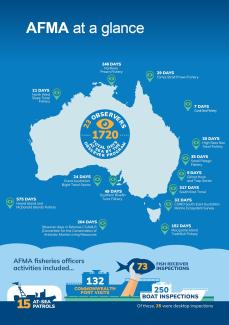
News
2024 review: Another big year in Commonwealth fisheries
Commonwealth fisheries sustainably produce hundreds of millions of dollars' worth of high-quality seafood every year for domestic and international markets.
These fisheries cover over 8 million km2 of water – from 3 nautical miles offshore to the limit of the Australian Fishing Zone.
AFMA had another big year of managing and monitoring Commonwealth fisheries in 2024.
- We assisted our counterparts in the Asia-Pacific region to continue the fight against illegal, unreported and unregulated (IUU) fishing by delivering monitoring, control and surveillance training in Kiribati, Cambodia, Thailand, Fiji and Vietnam.
- We hosted the joint coordination centre for Operation Nasse, a major international effort to detect, deter and disrupt IUU fishing on the high seas of the western and central Pacific Ocean involving authorities from Australia, France, New Zealand, the United States of America, Fiji, Vanuatu, the Cook Islands and the Pacific Islands Forum Fisheries Agency.
- In March, we sent delegates to the 9th World Fisheries Congress in Seattle, Washington, where AFMA hosted a symposium to share insights and discuss the challenges of integrating climate risk into decision-making processes, and managing multi-species fisheries in a climate change hot spot.
- Our Lakes Entrance fisheries officers met the public at the Hooked on Lakes Entrance seafood and fishing festival over the March long weekend.
- We worked with Australian and Papua New Guinea authorities to register 66 vessels from the villages of Mabaduaun, Sigabadura, Parama, and Kadawa in Papua New Guinea, ensuring their owners can excercise their rights to conduct traditional activities in the Torres Strait Protected Zone.
- In April we delivered a workshop in Tuvalu in partnership with local authorities to support their consideration of joining the international Agreement on Port State Measures to Prevent, Deter and Eliminate IUU Fishing.
- We facilitated another successful fishing season for black teatfish in the Torres Strait with nearly 16 tonnes caught in four days, adding ovber half a million dollars to the local economy.
- In May, 3 AFMA staff members attended a Women in Fisheries workshop in Bangkok, Thailand, alongside participants from Cambodia, Indonesia, Laos, Malaysia, Papua New Guinea, Philippines, Timor Leste, Vietnam and Thailand.
- In June, the crew of the commercial fishing vessel Australia Bay II removed a 3-tonne ghost net from waters northeast of Arnhem Land and brought it to Darwin, where AFMA arranged its safe disposal.
- We delivered public information workshops on the risks associated with illegal fishing ventures in Australian waters to fishing communities in Oesapa and Papela in the East Nusa Tenggara province of Indonesia.
- In August, we conducted a 7-day patrol of major Torres Strait fisheries with the Queensland Police Service and found a high level of compliance.
- We trialed the use of electronic monitoring systems in the Commonwealth Trawl Sector, Great Australian Bight Trawl Fishery and Northern Prawn Fishery.
- In September, AFMA Commissioners attended the Seafood Directions conference, a key forum for the seafood industry and supply chain.
- We commenced trials of AFMA’s Climate Risk Framework, a risk-based approach to integrate climate risks into decision-making processes. The framework has been received well by Commonwealth stakeholders and has piqued the interest of other jurisdictions, including internationally.
- Our compliance operations led to the prosecution of 170 Indonesian nationals and 2 Australian fishers for offences against the Fisheries Management Act 1991 (Cth) and the Torres Strait Fisheries Act 1984 (Cth).
In the 2023–24 financial year:
- AFMA’s Observers spent 1,720 days at sea, ensuring Australia’s Commonwealth fisheries are among the best managed in the world.
- Our fishery officers conducted 250 boat inspections, 132 Commonwealth port visits and 15 at-sea patrols.
- Commonwealth fisheries sustainably produced over 63,600 tonnes of seafood in total.
Looking ahead, there is plenty more work to do. In 2025:
- We’ll continue our work with fishers and research partners to implement best-practice management. That includes understanding and accounting for the impact of climate change on our fisheries.
- We’ll keep protecting our industry by working with other Australian authorities and our international counterparts to detect and deter illegal foreign fishing activity in Australian waters.
- We’ll stay dedicated to helping protect our precious marine environment.
- We’ll keep doing our part to protect the traditional way of life and livelihood of Torres Strait Traditional Inhabitants through sustainable fishing.
